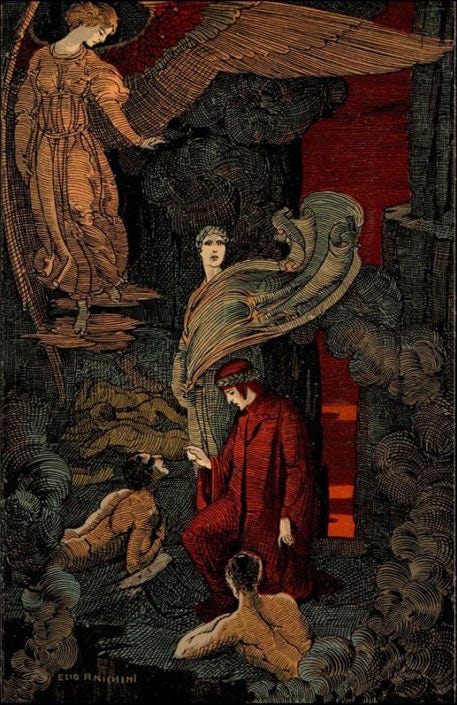Canto 19 is short and sweet, which after last week’s double installment I expect you will be happy to hear.
In this canto, Dante opens the narrative at dawn with a very creepy dream. But before he actually gets to the dream he uses one of his super niche metaphors to let us know it is dawn.
He says that it was the hour when the geomancers, which were a type of fortunetellers who draw random dots with sticks and then trace lines over them until the result looks like a geometrical figure (I know), saw their signs of Greater Fortune in the sky.
Greater Fortune was a figure that contained some dots arranged in the same way as some stars from the Aquarius and Pieces constellations, which could be seen just before dawn. All this to say: it’s almost dawn and the poets can start trying to find their way to the 5th terrace.
But before Dante can move, he is taken over by a sudden sleep in which he sees an old crone approach him. The woman doesn’t speak until Dante makes eye contact with her at which point she becomes so beautiful that he cannot make himself look away. She also starts to sing a song that reveals that she is a siren and that she has led many men astray with her charms, including the great Ulysses. Before she can finish her song, however, another woman appears, “holy and alert”, and she starts calling out for Virgil, who comes over and literally guts the siren, exposing her fetid insides.
It’s not revealed who the holy woman is - you can take your pick from the Virgin Mary, Saint Lucia, Beatrice, an angelic personification of caritas or temperance or reason - but the old lady turned siren is none other than the personification of avarice.
In fact, as soon as Dante wakes up from the dream, he and Virgil hear a voice calling them to the next staircase, which will take them up to the 5th terrace, where souls are atoning for that exact sin.
This angel is beautifully described as having a kinder and more gentle voice than you could ever hear among the living as well as swan-like wings. As Dante and Virgil walk past it, it says “blessed are those who mourn, for they will be comforted” and wipes away the 4th P off Dante’s forehead, to signify that he has overcome sloth.
And up we go into the terrace of the avaricious, which Virgil explains is where people work their way out of the grip of the old crone Dante saw, thus confirming the symbolic value of the dream.
Terrace 5 is full of people who are lying down on their front with their faces on the ground and crying and sighing into the earth. The contrapasso relationship between vice and punishment here is that these people who spent their lives caring so much about material things (and therefore looking down at their earthly realities rather than turning their faces to God), shall atone by literally looking at the ground as closely as possible.
They also sing - although not entirely intelligibly - Adhesit pavimento anima mea, from Psalm 119:25 and meaning ‘I cleave to the ground’, a renunciation of earthly possessions.
At this point, Dante and Virgil have a brief back and forth about which way they should go and one of the penitents answers that they should keep right and they’ll get to the next staircase.
But of course, Dante now wants to know more about the man and this is how we find out that the person speaking is none other than Ottobono dei Fieschi who became Pope Hadrian V in 1276, although only for 38 days (he died).
Hadrian is only one of two popes in the whole of the Divine Comedy who are not consigned to Hell. And even he is present here as a vehicle for a critique of the Church. He tells Dante that when he became pope, he was just as intent on continuing to strengthen the Vatican’s economic and political position as the rest of his fellow clergymen.
But towards the end of his life, he says, he discovered the false nature of the life he had lived. Just like the siren from the start of the canto, outwardly beautiful but rotten on the inside, Hadrian realised that the life of riches he had lived up until that point was not only hollow but corrupted.
The canto closes with a reminder of the love of God as the great equalizer. Hearing that he is being addressed by a pope, Dante kneels next to Hadrian. But the man tells him to stand up. After all, they are both “co-servants” of the same power. He adds a verse from the Gospel of Matthew in which Jesus, speaking to the Saduccees, says that there will be no such thing as social rank in the kingdom of God.
On a last note, Hadrian mentions his niece Alagia to Dante, the last remaining virtuous person in his family, and the only one who could pray for him and thus help him advance to heaven sooner.


